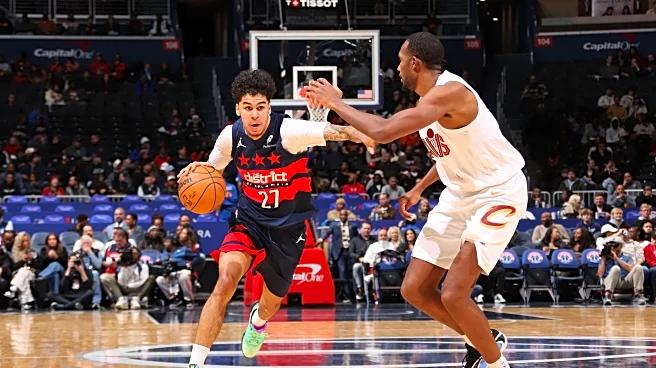What's Happening?
As Black Friday 2025 approaches, major retailers are unveiling significant discounts on menswear, offering consumers the opportunity to purchase clothing and activewear at reduced prices. Brands such as Adidas,
Gymshark, and Nike are providing up to 50% off on various items, including casual and performance wear. Additionally, retailers like Asos and Footasylum are offering substantial savings on thousands of styles, with discounts reaching up to 75%. This annual shopping event is a prime opportunity for consumers to refresh their wardrobes with both casual and gym apparel, as well as outdoor gear. The sales are not limited to clothing, as discounts extend to footwear and accessories, providing a comprehensive shopping experience for consumers looking to capitalize on the seasonal deals.
Why It's Important?
The Black Friday sales event is a critical period for both retailers and consumers, significantly impacting consumer spending patterns. For retailers, it represents a chance to boost sales and clear inventory before the end of the fiscal year. Consumers benefit from the opportunity to purchase high-quality items at lower prices, which can lead to increased spending and economic activity. The discounts offered by major brands can influence consumer behavior, encouraging purchases that might otherwise be postponed. This event also highlights the competitive nature of the retail industry, as brands vie for consumer attention with attractive deals. The widespread participation of well-known brands underscores the importance of Black Friday in the retail calendar, affecting both short-term sales figures and long-term brand loyalty.
What's Next?
As Black Friday progresses, retailers are expected to continue updating their sales offerings, potentially increasing discounts or expanding the range of items on sale. Consumers are likely to see further reductions as the event unfolds, particularly as retailers aim to maximize sales during this peak shopping period. The success of Black Friday sales could influence retail strategies for the upcoming holiday season, with potential adjustments in marketing and inventory management. Additionally, consumer feedback and purchasing trends observed during this period may inform future sales events and promotional strategies. Retailers will closely monitor sales data to assess the effectiveness of their Black Friday campaigns and make necessary adjustments for future events.
Beyond the Headlines
The Black Friday sales event also raises questions about consumerism and sustainability, as the push for discounted goods can lead to increased consumption and waste. Retailers face the challenge of balancing attractive sales with responsible business practices, including ethical sourcing and environmental considerations. The event highlights the cultural significance of Black Friday as a shopping tradition, influencing consumer expectations and behaviors. As consumers become more aware of sustainability issues, retailers may need to adapt their strategies to align with evolving consumer values, potentially incorporating more sustainable practices into their operations.











